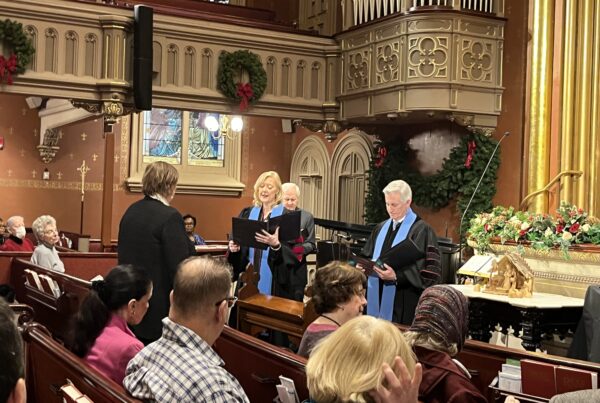A description of spiritual direction
What do spiritual direction and maple syrup have in common? I would have said nothing until making breakfast one morning about ten days after my father-in-law passed away. I reached up to the top cupboard shelf for something and a whole glass bottle of pure maple syrup crashed onto the Spanish tile on the kitchen floor. Before me was a thick, sticky mess with all sizes of glass mixed into the liquid amber sweetness that my husband occasionally drinks straight from the bottle.
On this occasion, rather than taking a slug of syrup, my husband took the rubber kitchen mats outside and hosed them off while I picked up the biggest pieces of glass. Then on my hands and knees, I started mopping up the spill; without warning, the tears started to flow. This was certainly not how I wanted to spend the first hour of my day, and I most certainly did not want to face the grief in front of me. Grief is hard to walk through, and my soul felt like a sticky mess.
In the midst of the clean-up effort, I decided I had to be honest with myself and God. Even though I was experiencing great sorrow and had little desire to come clean with God about my frustrations and sadness, I also decided not to cancel my upcoming spiritual direction session. I needed a space to process the full-range of my emotions. Moreover, I realized that in my work as a spiritual director, I help others pay attention to the sticky life experiences, including the losses, the longings, and the loneliness that so often plague the soul.
As I wiped the floor for the third and fourth time, a friend arrived to help me get the house ready for guests arriving for the funeral services. What a relief knowing I was not alone with my messy floors and raw emotions. Spiritual directors are companions who, month after month, create space for the prayerful processing of the myriad of thoughts, feelings, and insights from God that swirl in our souls. Within the sacred moments of spiritual direction, there is room for alignment of heart, soul, mind, and strength, which brings clarity to one’s faith and intimacy with the Lord.
A definition of spiritual direction
In their book, The Practice of Spiritual Direction, William A. Barry and William J. Connolly unpack their understanding of spiritual direction and the actual experiences within someone’s life and, in particular, his or her relationship with God. Barry and Connolly define spiritual direction as help given by one believer to another that enables the latter to pay attention to God’s personal communication to him or her, to respond, to grow in intimacy with God, and to live out the consequences of the relationship.
Major life transitions, such as a death, a move, a job change, an empty nest, going off to college, a new baby, a chronic illness, retirement, and/or relational challenges, can be an impetus to reach out for extra support. Spiritual directors prayerfully listen and take notice of how God is at work, then they ask questions that will deepen another’s experience of God. To that end, their encouragement to live and love with authenticity is paramount.
Related: The power of spiritual direction and spiritual self-care
When someone begins spiritual direction, I tell them that these will not be coaching, counseling, or mentoring sessions. However, in all reality, there are times when elements of these three can be present. We are spiritual, emotional, and physical beings, and we all have vocational work. Just as a coach, a counselor, or a mentor focuses on his or her area of expertise, a spiritual director focuses on spiritual wholeness and greater awareness of God and self by encouraging the practice of various forms of prayer and other spiritual disciplines. David G. Benner writes in his book The Gift of Being Yourself: “Deep knowing of God and deep knowing of self always develop interactively. The result is the authentic transformation of the self that is at the core of Christian spirituality.”
A discipline of spiritual direction
For some, the resolution of the transition is also the dissolution of the spiritual direction relationship. But for others, as months go by and intimacy with the Lord increases, the practice of seeing a spiritual director is regarded as so beneficial for overall spiritual health and soul care that it remains an ongoing spiritual discipline. As an aside, it is not unusual for someone to have the same spiritual director for many years; however, the life experiences of the director and/or the person coming for direction can warrant the need for a different spiritual director.
The writer of the book of Hebrews reminds us that faith is the assurance of things hoped for, the conviction of things not seen (Hebrews 11:1). To engage in the practice of spiritual direction is to hope with courageous conviction that the messiness of one’s inner lives can be and will be tenderly redeemed. Moreover, opening to receive the Lord’s new mercies that become evident during a spiritual direction session, results in deeper, abiding faith.

Jill Sweet
Jill Sweet received her MDiv from Western Theological Seminary and her DMin from Fuller Theological Seminary in spiritual direction. She oversees Come Learn Rest Ministries, which provides soul care for ministry leaders and supervision for fellow spiritual directors. She is passionate about spiritual direction and sharing sacred moments with others. When she is not at home in Oakdale, California, she gravitates toward the stillness of the Bridger Tetons in Wyoming.



